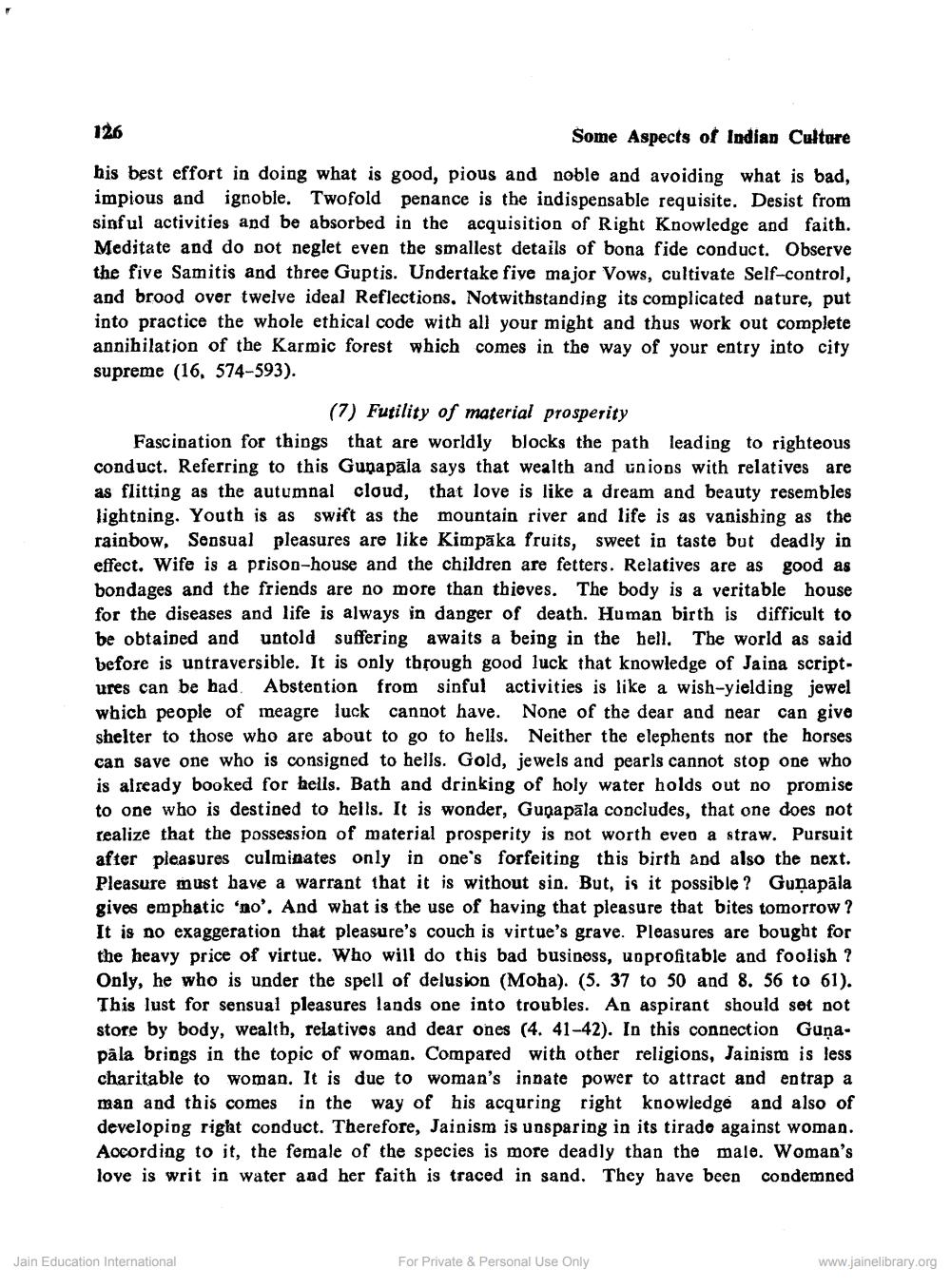________________
126
Some Aspects of Indian Culture
his best effort in doing what is good, pious and noble and avoiding what is bad, impious and ignoble. Twofold penance is the indispensable requisite. Desist from sinful activities and be absorbed in the acquisition of Right Knowledge and faith. Meditate and do not neglet even the smallest details of bona fide conduct. Observe the five Samitis and three Guptis. Undertake five major Vows, cultivate Self-control, and brood over twelve ideal Reflections. Notwithstanding its complicated nature, put into practice the whole ethical code with all your might and thus work out complete annihilation of the Karmic forest which comes in the way of your entry into city supreme (16, 574-593).
(7) Futility of material prosperity Fascination for things that are worldly blocks the path leading to righteous conduct. Referring to this Guņapāla says that wealth and unions with relatives are as flitting as the autumnal cloud, that love is like a dream and beauty resembles lightning. Youth is as swift as the mountain river and life is as vanishing as the rainbow, Sensual pleasures are like Kimpāka fruits, sweet in taste but deadly in effect. Wife is a prison-house and the children are fetters. Relatives are as good as bondages and the friends are no more than thieves. The body is a veritable house for the diseases and life is always in danger of death. Human birth is difficult to be obtained and untold suffering awaits a being in the hell. The world as said before is untraversible. It is only through good luck that knowledge of Jaina scriptures can be bad. Abstention from sinful activities is like a wish-yielding jewel which people of meagre luck cannot have. None of the dear and near can give shelter to those who are about to go to hells. Neither the elephents nor the horses can save one who is consigned to hells. Gold, jewels and pearls cannot stop one who is already booked for hells. Bath and drinking of holy water holds out no promise to one who is destined to hells. It is wonder, Guņapāla concludes, that one does not realize that the possession of material prosperity is not worth even a straw. Pursuit after pleasures culminates only in one's forfeiting this birth and also the next. Pleasure must have a warrant that it is without sin. But, is it possible? Guņapāla gives emphatic 'no'. And what is the use of having that pleasure that bites tomorrow? It is no exaggeration that pleasure's couch is virtue's grave. Pleasures are bought for the heavy price of virtue. Who will do this bad business, uoprofitable and foolish ? Only, he who is under the spell of delusion (Moha). (5. 37 to 50 and 8. 56 to 61). This lust for sensual pleasures lands one into troubles. An aspirant should set not store by body, wealth, relatives and dear ones (4. 41-42). In this connection Guņa. päla brings in the topic of woman. Compared with other religions, Jainism is less charitable to woman. It is due to woman's innate power to attract and entrap a man and this comes in the way of his acquring right koowledge and also of developing right conduct. Therefore, Jainism is unsparing in its tirade against woman. According to it, the female of the species is more deadly than the male. Woman's love is writ in water and her faith is traced in sand. They have been condemned
Jain Education International
For Private & Personal Use Only
www.jainelibrary.org




